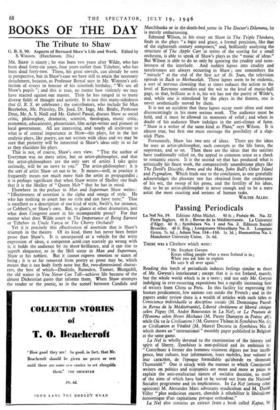BOOKS OF THE DAY
The Tribute to Shaw
G. B. S. 90. Aspects of Bernard Shaw's Life and Work. Edited by S. Winsten. (Hutchinson. 21s.) Mx. SHAW is ninety ; he was born two years after Wilde, who has been dead forty-six years, four years earlier than Tchehov, who has
been dead forty-two. These, his great -coevals, can already be seen in perspective, but in Shaw's case we have still to attain the necessary detachment, because, as Professor Bernal says in Mr. Winsten's col- lection of essays in honour of his ninetieth birthday, " We are all Shaw's pupils "; and this is true, no matter how violently- we may have reacted against our master. Then he has ranged in so many diverse fields of thought and activity. It is just this many-sidedness
that G. B. S. 90 celebrates ; the contributors, who include Sir Max Beerbohm, Mr. Priestley, Dr. Joad, Dr. Inge, Mr. Bridie, Professor
Dent, Mr. A. S. Neill and Mr. Gabriel Pascal, discuss Shaw as social critic, philosopher, dramatist, scientist; theologian, music critic, economist, educationist, phonetician, film script-writer and pioneer in local government. All are interesting,' and nearly all irrelevant to what is of central importance in Shaw—his plays, for in the last analysis plays, like poetry, are not written with ideas and we may be sure that posterity will be interested in Shaw's ideas only in so far as they elucidate his plays.
This is not, of course, Shaw's own view. " That the author of Everyman was no mere artist, but an artist-philosopher, and that the artist-philosophers are the only sort of artists I take quite Seriously, will be no news to you." The artist-philosopher: it is the sort of artist Shaw set out to be. It means—well, in practice it frequently means not much more thaii the artist as propagandist ; it is perhaps significant that when Shaw writes of Shelley one finds that it is the Shelley of " Queen Mab " that he has in mind. Elsewhere in the preface to Man and. Superman Shaw writes : " Effectiveness of assertion is the alpha and omega of style. He who has nothing to assert has no style and can have none." That is excellent as a description of one kind of style, Swift's, for instance, or Cobbett's, or Shaw's own. But, to glance at other dramatists, just what does Congreve assert in his incomparable prose? For that matter what does Wilde assert in The Importance of being Earnest or Tchehov in Uncle Vanya or The Cherry Orchard?
Yet it is precisely this effectiveness of assertion that is Shaw's triumph in the theatre. Of its kind, there has never been better prose than Shaw's. It is unsurpassed as° a vehicle for the witty
expression of ideas, a competent .actor can scarcely go wrong with it, it holds the audience by its,' sheer brilliance, and it can rise to superb eloquence, as in the Hell scene in Man and Superman, Shaw at his noblest. But it cannot express emotion or states of being ; it is as far removed from poetry as prose may be,. which means that it can body forth none but flat, two-dimensional charac- ters, the best of which—Doolittle, Ramsden, Tanner, Bluntoschli, the old waiter in You Never Can Tell—achieve life because of the , almost Dickensian gusto that informs them. When Shaw attempts the tender or the poetic, :as in the scenes between Candida and
Marchbanks or in the death-bed scene in The Doctor's Dilemma, he is merely embarrassing.
Edmund Wilson, in his • essay on Shaw in The Triple Thinkers, finds in the plays "a logic and grace, a formal precision, like that of the eighteenth century composers," and, brilliantly analysing the structure of The Apple Cart in terms of the scoring for a small orchestra, is able to speak, of Shaw's plays as the " music of ideas." But Wilson is able to dq - so only by ignoring the crudity and taste- lessness of the interlude. And sudden lapses into crudity and tastelessness are always occurring in Shaw ; one remembers the " miracle " at the end of the first act of St. Joan, the television episode in Back to Methuselah. These lapses seem to be endemic, a sort of nervous clowning that at times reduces the action to the level of Keystone comedies and the wit to the level of music-hall gags, so that, brilliant as it is, his wit has not the purity of Wilde's, and, while one is stimulated by the plays in the theatre, one is never aesthetically moved by them.
It is not an accident that these lapses occur most often and most disconcertingly in his more serious work. The audience must be held, and it must be allowed its moments of relief ; and when in doubt of his audience Shaw indulges in the anti-climax of farce. " Shaw is a writer of the same kind as Plato," says Wilson. It is almost true, but first one must envisage the possibility of a slap- stick Plato.
Fortunately, Shaw has two sets of ideas. There are the ideas he uses as artist-philosopher, such concepts as the life force, the superman, and so on. Then there are the ideas that the satirists have traditionally relied on, the appeal to common sense as a check to romantic excess. It is the second set that has produced what is artistically his finest work, the comparatively unambitious plays like The Devil's Disciple, Arms and the Man, John Bull's Other Island and Pygmalion. Which leads one to the conclusion, as one gratefully acknowledges the pleasure one has obtained from the exuberance of his wit, the sweep of his prose, and the fertility of his ideas, that to be an artist-philosopher is never enough and to be a mere artist the most exacting and serious of human tasks.
WALTER- ALLEN.


























 Previous page
Previous page